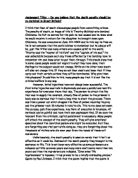What Is Donne's attitude to death in his poems? You should base you answer on Death be not proud and one another sonnet of your choice.
What Is Donne’s attitude to death in his poems? You should base you answer on Death be not proud and one another sonnet of your choice.
Although both sonnet X and I are both about death, the idea is introduced to us in two completely different perspectives. In Sonnet X Donne challenges death but in the other he fears it.
In Sonnet X, “Death be not proud”, Donne challenges death. He says that death should not be boastful, although it sounds dreadful and powerful, it is actually nothing but a deep sleep, which can be a resting and peaceful. When a person dies their body rests while their soul is set free. He explains that death is merely a slave to chance, thus it shouldn’t be so proud. As he believes after a short sleep comes eternal life, where death does not exist.
This is a very powerful sonnet as it begins with Donne challenging his greatest fear, “Death be not proud”, he is almost dismissing death in a very scornful way. The emphasis of “Death” is even greater as the first foot is reversed, as if it is thrown at us. He then goes on to say that though death has been called “mighty” and Dreadful” it is not so, “thou art not so”, each of the words here are stressed almost forces us to believe that death can only bring pleasure. Here he is wiping this common image of death from our minds and correcting it. He begins to create a new image of death, “poor death”, with this statement he challenges the idea of death. He puts death down, by saying that it is not powerful; in contrary to this, he describes death as poor something that is powerless and weak. Therefore incapable of killing Donne, “Canst thou kill me”. In the next couplet he develops his argument by declaring that death is nothing more than a little rest or sleep. And if rest and sleep give us pleasure death must be greater pleasure, as it is longer. The alliteration used here emphasis this point. He then says that some of our best people are lost to death where their body rests, “rest of their bones” and souls are set free, “soul's delivery”. This is a very positive comment; it makes death something to look forward to rather than fear. It also shows that he is not afraid of it. He then mentions that death isn’t powerful as it is a slave to chance, fate, war and sickness. “Thou'rt slave to fate…and dost with poison, war, and sickness dwell”, the use of negative imagery puts it down from something powerful to something meaningless. The images of man-made destruction also suggests that death occurs with a little “help”, it doesn’t work achieve the death of people’s life by itself. He goes further, by mentioning that “poppy, or charms can make us sleep as well”, therefore death is not significant, as opium or spells can give us better sleep. So he questions death, by asking it why is it so proud if it is powerless and insignificant, “why swell’s thou then?” especially since we awake to eternal life after this “short sleep”, to a life where death doesn’t exist; a place where death itself is dead. The final couplet is very powerful it concludes his logical argument and shows us Donne’s certainty in resurrection.







